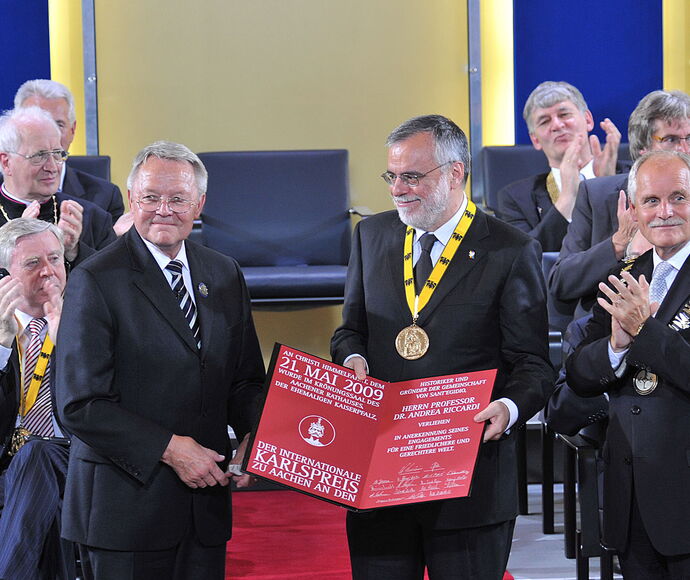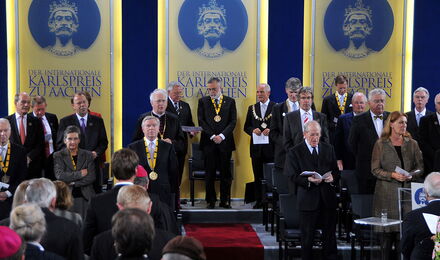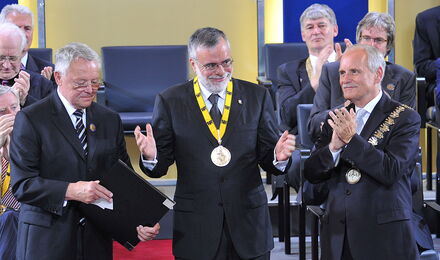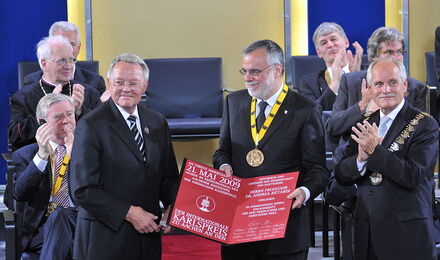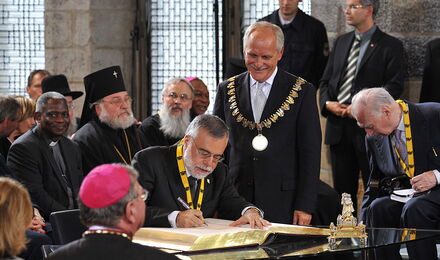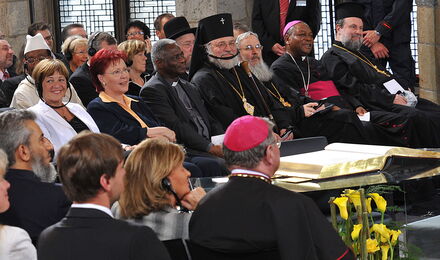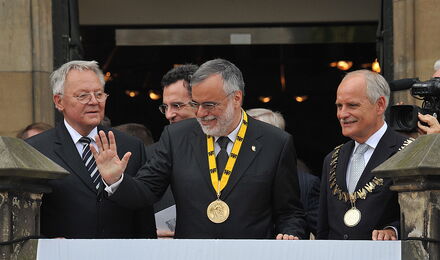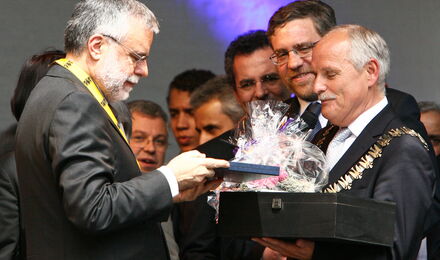Award of the International Charlemagne Prize of Aachen to the historian and founder of the Community of Sant'Egidio, Prof. Dr. Andrea Riccardi
With breathtaking speed, the original community of six has developed into a union of 27; a union that now encompasses almost the entire continent. However, the further the EU extends, the more sceptical, it seems, its citizens are towards it. And the much more important questions about the intellectual and cultural roots of a united Europe, its fundamental values and its internal cohesion have sometimes been overlooked in favour of economic, monetary and socio-political integration, enlargement strategies and many other day-to-day political issues.
If we want to win over the citizens for further unification of our continent and take them with us, then it must be our primary goal that people see a Europe that is intellectually, morally and politically worthy of being built. We have the necessary material conditions in the EU to solve our economic and social problems. But whether we win the future is essentially a question of the spiritual state of Europe and its inner cohesion. This is primarily about intangible values, about our understanding of human dignity and democracy, freedom and responsibility – and thus always also about the role of civil society.
Europe does not live from states, governments or institutions alone, but first and foremost from the willingness of its citizens to get involved in the community, to take a stand and to take responsibility. Europe lives through the people who represent European values in the EU and also at the international level and who set a very concrete example.
In honour of an outstanding example of civil society commitment to a humane and – both within and beyond its borders – united Europe, to the understanding between peoples, cultures and religions, and to a more peaceful and just world, the Board of Directors of the Society for the Conferring of the International Charlemagne Prize of Aachen honours the Italian historian and founder of the Community of Sant' Prof. Dr. Andrea Riccardi.
‘We possess precious values with a wealth of freedom, faith, solidarity, culture and humanity that are important for the future of the world. We must not lose our way, because then an important part of humanity would be lost in today's world. However, divided, we will scatter and lose our way and lose what we stand for. [...] United, as Europeans united in our diversity, we will be a friendly and solid force in today's world: a source of humanity. We must foster a growing passion for Europe and the unifying power among our fellow European citizens. This is not a vague passion. Being a European in the world is becoming a calling. In this world of ours, even a few – and we are not so few – can influence the future. If on 11 September 2001 a few people were able to bring confusion and death to the whole world through terrorism, then a few or many can offer peace and ideals to many Europeans with the dream of a united Europe. That is European humanity, which is capable of building peace.’
When Andrea Riccardi describes the guiding principles of his and his colleagues' work, it is always also an encouragement and a call to Europeans to actively participate in shaping a more peaceful and just world by virtue of their cultural and spiritual traditions.
Andrea Riccardi was born on 16 January 1950 in Rome and spent part of his childhood in Rimini. After graduating in law, he specialised in contemporary and church history; he has been a university lecturer since 1981. After initially working at the University of Bari and the Sapienza University of Rome, he is now a full professor of contemporary history at the Università degli Studi Roma Tre. Numerous monographs on important issues in the modern history of the church and Christianity, as well as several hundred articles, document his wide-ranging academic interests and profound knowledge of various religious, cultural and political movements in the past and present. His particular interest lies in the relations between the different religious worlds and the question of the possibility of a peaceful religious cohabitation of diverse religious traditions, especially in the Mediterranean region of the 19th and 20th centuries.
Riccardi has received a great deal of international attention as the ‘spiritus rector’ of the Community of Sant'Egidio, which he founded in Rome in 1968 together with a few friends while he was still at high school. Over the past four decades, the Catholic lay movement has grown into a global network of relationships that (according to its own information – there are no formal membership lists or cards) has over 50,000 members in more than 70 countries on four continents, with a following that is not least made up of young people.
In addition to praying together and sharing the gospel, the volunteer members of the community have set themselves the goal of friendship with the poor, ecumenism and the service of peace. ‘In Rome alone, the volunteers look after 10,000 people, immigrants, homeless people, drug addicts or the ever-increasing number of elderly people and families who, with their incomes in expensive Rome, no longer make it to the end of the month. Five times a week, the community provides them with a hot dinner at its centres. They receive language lessons, legal advice [and] medical attention’. (Süddeutsche Zeitung, 21 December 2007)
Internationally, the community focuses particularly on people with AIDS in Africa. For example, the DREAM programme (Drug Resource Enhancement against AIDS and Malnutrition), launched by Sant'Egidio, provides care for several tens of thousands of people in Africa, treating AIDS and combating malnutrition. Numerous other projects in the area of humanitarian emergency and disaster relief characterise the commitment of Catholic lay people, especially in Africa, but also in South America and Southeast Asia.
Riccardi and his colleagues attracted worldwide attention by the early 1990s at the latest. After coming into contact with the chaos of war in Mozambique through the delivery of aid and simple construction projects, they became mediators in the negotiations that led to the peace agreement after more than a decade and a half of civil war. After more than two years of talks – mostly at the headquarters of the community, the former monastery of Sant'Egidio in the Trastevere district of Rome – the signing of the peace treaty between the government in Maputo and the Renamo guerrillas became possible on 4 October 1992, after Riccardi and other members of the Catholic laity had been able to establish a degree of mutual trust between the parties to the civil war. In recognition of this, the then UN Secretary-General Boutros-Ghali coined the term ‘Italian formula’, a unique blend of governmental and non-governmental activities in a peace-building effort.
Encouraged by this commitment, Riccardi and the Sant'Egidio community have since endeavoured to mediate in a large number of conflict zones around the world, ‘off the main diplomatic routes’ – in Algeria and Burundi, in Guatemala and Congo, in Uganda as well as in Kosovo and in numerous other crisis regions. ‘It has almost become routine for members of the Israeli government and representatives of the Palestinians to meet under the roof of Sant'Egidio, as have the public talks between representatives of groups that are at war with each other in Lebanon. But at least as extensive as the panel discussions are the many talks behind the scenes, the fruits of which may only be seen in a few years' time.’ (FAZ, 20 November 2008)
The commitment of the ‘UNO of Trastevere’, as the community is sometimes called, to the worldwide abolition of the death penalty has also received international recognition, as have the annual ‘prayers for peace’ organised by Sant'Egidio for around two decades. Inspired by the interreligious prayer of Assisi convened by Pope John Paul II in 1986, the Catholic laymen invite high-ranking and the highest representatives of the world religions, numerous political leaders, but also the general public, to a joint day of peace and prayer every year, in order, according to Riccardi, ‘to say in different languages and cultures that it is only through dialogue and open discussion with others that it is possible to build an authentic culture of coexistence, which is so vital for every society today.’
Sant'Egidio and Andrea Riccardi have already received many awards for their commitment to peace and their lasting contribution to interreligious and intercultural dialogue, including the World Peace Prize of the Methodists (1997) and the Mahatma Gandhi Silver Medal of UNESCO (1999). Four years later, the Italian was named a ‘European Hero’ by the renowned news magazine Time.
The Board of Directors of the Society for the Conferring of the International Charlemagne Prize of Aachen honours Prof. Dr. Andrea Riccardi, a great European who, in the best sense of the word, puts himself at the service of his fellow human beings in the spirit of love and help for his fellow human beings, who passionately advocates understanding across all confessional and national borders and who, with the Community of Sant'Egidio, makes a significant contribution to a more peaceful and just world. In his work over the past 40 years, Andrea Riccardi has set an outstanding and exemplary example of the European values of peace, solidarity and human dignity and of civil society engagement for a better world based on these values.
‘Aachen, in the heart of Europe, a city rich in history and always a meeting place, will be the capital of peace and a symbol of the old and new European reality: dialogue, not confrontation.’ This guiding principle for the 2003 World Day of Prayer for Peace, formulated by Andrea Riccardi, will also be the theme of the 2009 Charlemagne Prize award ceremony.




